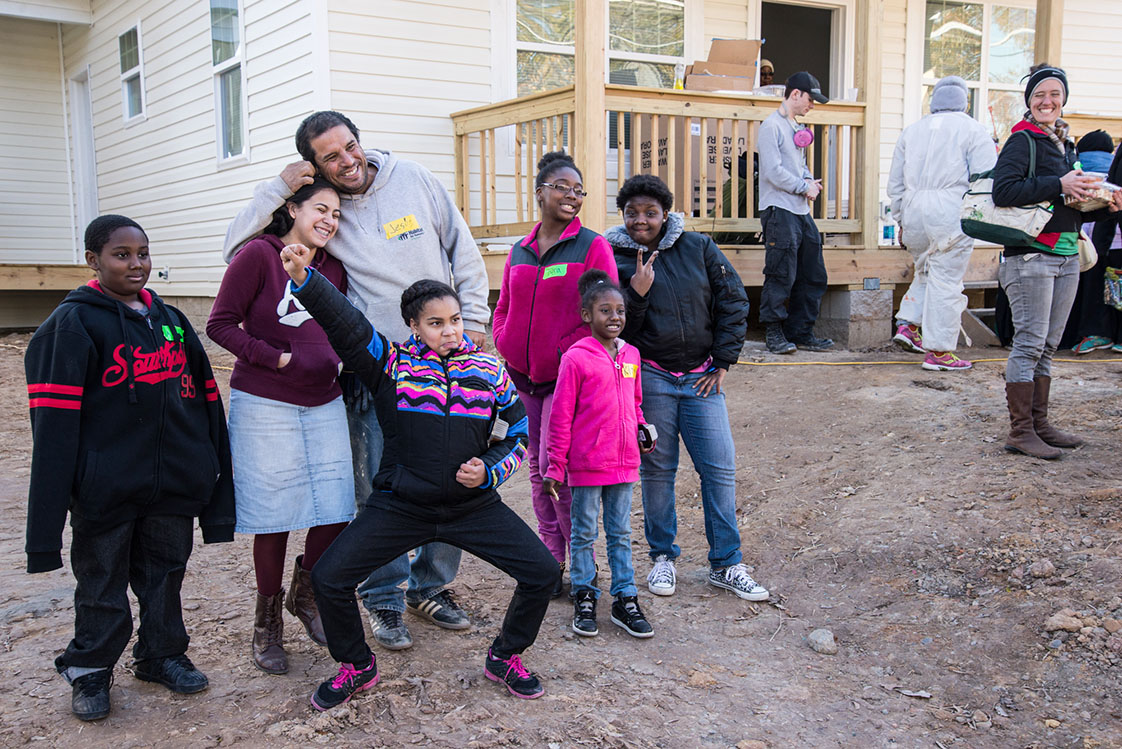
Celebrating a long day (nearly) finished and a job well done are (back) Antonio, Viviana, Jesus, Tyra, Yasmine, (front) Anaya and Kiyaja, with Anna Benfield on the far right, and a Habitat for Humanity crew working hard in the background. (Staff photo by Robert Berges)
When the family is working hard to buy a house, how can the children contribute?
By planting blueberries!
At least that was the answer Saturday afternoon Nov. 15 at the Angier Avenue Garden, where Durham Habitat for Humanity was testing a new program that will help children improve the neighborhood and buy houses.
They will all reap the benefits of hard work when blueberry pie season comes around in 2015. However, the hours they commit to gardening will also help their families to build “sweat equity,” a necessary part of buying a Habitat for Humanity home.
Anna Benfield, the Durham Habitat for Humanity volunteer manager who is coordinating the new program, said, “Everyone wants to have fun, but from a very young age kids have a desire to contribute, and engage in a meaningful way, especially when they see their parents doing it, when they see their family, their mom, their dad out building something and creating something, they want to be part of that.”
The problem is that it is neither legal nor safe to have children “helping” on an active construction site. However, with this new program a 10-year-old’s time spent planting the blueberries can become a true contribution to the family’s down payment.
Benfield explained that it takes 100 hours of sweat equity, or hours volunteering with Habitat for, before you can select a lot upon which to build your home. There is a minimum of 250 hours of sweat equity before you can move into your house, and that could rise up to 450 hours based on the number of adults in the home.
The program is designed to engage young people from six to 15 years old in activities that will help them build social skills by getting to know their neighbors. While activities, such as planting food crops in community gardens, will help them explore their potential as active members of the community.
“[Habitat for Humanity’s] idea is to never give something away,”Benfield said, “it’s to work in partnership with families to make an opportunity available that wouldn’t otherwise be there.
“Habitat is about building community, it’s about people working together to make something possible that seems impossible, and that’s what Angier Avenue Farm and SEEDS are about too,” Benfield said.
Angier Avenue Farm and SEEDS, are the two main agricultural organizations in the neighborhood that are interested in helping to make this new program a success.
According to Habitat for Humanity documents, other potential partners include the YMCA, the Scrap Exchange, Holton Career Center, the Museum of Life and Science, and others.
Habitat for Humanity will be looking for volunteers experienced in teaching or youth development who would be able to commit to the program, as well as families in the neighborhood who would be interested in attending, should contact Anna Benfield at 919-682-0516 ext. 112, or via email: ABenfield@durhamhabitat.org
You do not have to be a Habitat for Humanity volunteer or homeowner to participate.
Benfield stressed Habitat for Humanity’s commitment to maintaining the integrity and identity of northeast central Durham, saying, “I think it would be great to, as much as possible, rely on assets and resources that we already have [in northeast central Durham] and to build that up, and to give it a platform. As much as possible, Habitat wants to play a connector role – connecting people to resources, that’s what building community is all about.”
Durham Habitat for Humanity has built at least 11 homes in a three-block radius in Northeast Central Durham this year, but they would like to find more qualified families.
Benfield said, “It’s a really big priority for us to find qualified applicants in this neighborhood. We have lots, and it’s a big priority to see families already living in northeast central Durham staying in Northeast Central Durham, that homes are being bought by people that already live here, and we would love any help we can get in identifying qualified homebuyers.”
This youth program is one of many opportunities for the whole family to invest.
Benfield said, “Kids have a desire to contribute, and engage in a meaningful way, especially when they see their parents doing it, when they see their family, their mom, their dad out building something and creating something, they want to be part of that.”
Yasmine said she enjoyed planting blueberries with the youth program, and she is already looking forward to planting some flowers and fruits of her own: “Mums, roses, hybrids, tulips,” she sang, “peaches, apples, grapes and blueberries, as long as it doesn’t cause problems with what my dad wants to do.”
Yasmine, spotting the home that her parents built with Habitat for Humanity, called out,“See you Monday, pookie-wookie. That’s my house.”
“Bask in the Glory,” responded Tyra, her best friend and future first houseguest.
The new youth program, which hasn’t been named yet, is schedule to start in February of 2015, and will take place twice per month on Saturday afternoons.
Nadia Mercer says:
Wow! This sounds like a great program!